Laura Linney isn't important. "Meh," she shrugs happily. "I'm no one. I'm not Bill [Murray, taking tea in the next room]. I'm not a tentpole of culture." A cheery pause. "People can get nervous around me but that's just a weird sense of celebrity."
Silence descends, broken only by the clacking of her bangles. "The one thing I do get is that people are surprised I'm better-looking than they think I'm going to be. There's that. And that throws me sometimes."
Is that a nice thing to be told? "It's double-edged. Every once in a while I'm like: Oh, OK ... good. And then I'm like, well ..." People are so surprised! "Oh! You're good-looking!" Well, thanks ..."
In the flesh, Linney is formidable: very sharp, very pretty, maybe a little more blingy than you'd expect. Her face is a picture of health and polish, wide smooth plains cherry-topped by that pert nose. She gleams with good sense and robust perspective.
On screen, this lack of self-regard translates as something more conventionally subordinate. Linney's specialism is the serf under strain, the doormat you use at your peril – step on her too hard and she'll whip the rug from under your feet, then strangle you to death with the tacking. Her characters may seem together, even prim, but beneath their floral smocks lie simmering itches, strange vices.
She was the secretly kinky apple-cheeked wife in Kinsey. The ball-breaker in Love, Actually who ditched a new hunk in order to care for her learning-disabled brother. The country girl who bloomed in swinging San Francisco in Tales of the City. The splintery yet sympathetic sister of Mark Ruffalo in You Can Count on Me. The competent careerist who cracks in The Savages. The juggling mum acting out on the sly in The Big C.
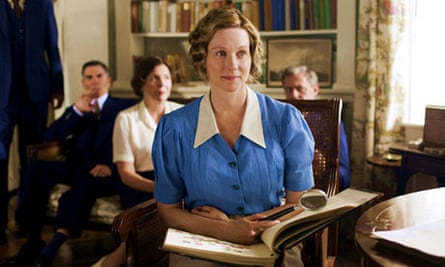
Her latest role breaks little new ground, but it's just as brilliantly realised. She plays Daisy – meek and unmarried – the real-life distant cousin of Franklin D Roosevelt (Murray), who meets him again in 1939, as he hosts a summit for George VI (fresh from speech therapy with Lionel Logue). Daisy offers easy relief for the president, from not just the pressures of office and impending war, but also from his mother, wife and whatever other aides he's sleeping with.
I'm Linney's final appointment at the Toronto film festival, where Hyde Park on Hudson premiered last year. Since then, it has dodged much of the awards glory showered on its Toronto stablemates (Argo, Silver Linings Playbook). It's a pity; Roger Michell's film is one of quiet delights and smart, restrained performances. Maybe too much restraint.
It lacks the tub-thump of The King's Speech, which it superficially resembles. And although Linney was in the TV series Tom Hooper made before that – as the suffer-no-fools spouse of John Adams – she seems allergic to overt show.
It's a quality she admires in Daisy. "She was passive, but she had a strong spine and she got a lot done. I think she was unique in that she needed very little attention. And that's very against our culture right now, where everyone has to raise their own flag and call attention to themselves. Where everyone's fighting for acknowledgment or a prize. She was fine. Just fine."
The film is inspired by those pages of Daisy's diaries that weren't ripped out or burned. Richard Nelson, whose radio play Hyde Park on Hudson is adapted from, suggests a sexual element to the relationship, and Linney backs up his thesis – whatever happened, she thinks, it was "non-platonic ... a very deep and devoted friendship".
Linney's research took her to Daisy's old bedroom, where she spent most of her life, before dying in 1991, aged 99. "She woke every morning to a huge portrait of FDR that was across her bed. And then next to that was a vitrine filled with little knick-knacks he had bought her round the world. And all these books about mysticism and health and big iconic figures like Napoleon."
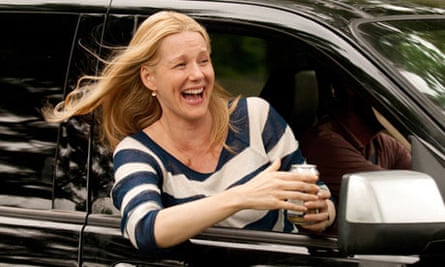
The diaries themselves Linney found less stimulating – "interesting and boring and sweet, like those of any non-brilliant person" – but the handwriting was potent. "She shared a certain penmanship with my grandmother. And I remember her; her sensibility and the way she used to talk. She was a flapper. There was a delight about her, and a simplicity in that delight that was fun. Yet there was a lot that wasn't understood." Such as? "Sexual relations. It was a completely different world. Particularly for women. They knew nothing."
The one erotic moment in Hyde Park on Hudson comes when FDR drives Daisy to a remote meadow and she dutifully delivers a handjob in the front seat. We see nothing save him unzipping, her vaguely baffled expression, then, in long shot, the car creaking gently. For all its coyness, I say, it's strangely graphic.
"Mmm-huh. Something happens there, yeah." Yet it's hard to imagine one's grandmother doing such things. "Yeah. But guess what? She did." Linney cackles happily. "They all did. They must have. It just wasn't talked about. It was just between them."
The film ends with what could be read as a quasi-endorsement of Roosevelt's love life; one that suggests great men could be granted a free pass.
Perhaps as long as there's honesty, fidelity is a luxury? Linney declines the invite to the moral high-ground. "I can't say if that's OK or not OK. Is it OK to deceive people? No. Is it OK to take advantage of people? No. Does it happen all the time? Yes. Do I think it's OK? It's not my business. I know how I would be comfortable but I can't speak for anybody else."
It's curious how the discretion and tolerance around Roosevelt's adultery compares with the outrage in the UK that prompted the abdication crisis. Were we just more puritanical? "No, oh no. America's very puritanical. That's in our heritage. That's why I think people are so judgmental about people's sexual needs. Everyone wants to get in everybody's sexual business. It's fascinating and it freaks people out. But it's been going on forever. In every country. Since the beginning of time. Would I like to be in that situation? Absolutely not. Could I survive that? No. But many people do."
Linney was born in New York, 49 years ago. Her parents split up when she was an infant; she lived with her mother, a cancer nurse, in a one-bedroom flat, but stayed close to her father, a playwright called Romulus, who died in 2011. There's a touching joint interview they did a few years beforehand; he's besotted, keeps trumpeting the incisiveness of his daughter's remarks.
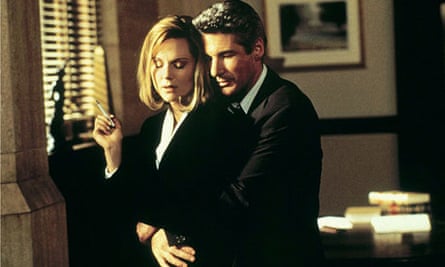
She acted at school and went to Northwestern University, but realised she didn't like it, so studied in the library every night for a year to get the grades to transfer to Brown. From there, following a brief spell as a special-needs teacher, she progressed to Juilliard, emerging from full-time education at 26. Bit-parts in films and a lot of stage work followed, before her breakthrough in You Can Count on Me in 2000. She has worked with the same people many times: Sean Penn, Richard Gere, Clint Eastwood. She starred alongside Liam Neeson in The Crucible on stage, then Kinsey on screen, then he walked her down the aisle three years ago when Linney got married for the second time, to an estate agent she had met at the Telluride film festival.
It's easy to see how Linney would attract affection and loyalty, even a protectiveness that she may not in fact require. In Hyde Park on Hudson, she isn't just the innocent stooge, she's also the audience's way in, for Daisy narrates. The poster shows her popping out from behind Murray's head, fixing us with a wry smile. It's the same expression that figures large when she introduces each episode of Downton Abbey on PBS in the US – cosy, but knowing, too. And it's this sense that she's on our side which perhaps protects her from personal intrusion.
Social media confounds her, as it can tend to for those who have no need to celebritise their own life. She's disquieted by what she perceives as mushrooming exhibitionism, by the "bullying" of advertising and marketing, which she thinks Facebook encourages. "I'm sick of it. Exhausted. And it makes me numb and that's dangerous. People are just under a barrage. There's no time to think and people aren't making their own opinions. And it makes intimacy almost impossible. And I find that worrisome, really worrisome. What's going to happen in time, with a generation of people who have that kind of ADD?"
She sighs; her first of the interview. "There's this distrust of time that concerns me."
In terms of allowing oneself to reflect? "Yeah! Process! Hey there! Think! Then see what happens."
Why do people distrust time? "Because they think it's against them and not with them."
But it is against them, right? "In terms of: are we all dying? Yes! But what time gives you, if you allow it, is pretty valuable."
She sighs again, looks close to a kvetch, then smiles conspiratorially. "But, at the end of the day, I think everybody's OK. I think it's all OK." A friendly thump to the table. "It's all going to be OK, y'know?"
Hyde Park on Hudson is released in the UK on 1 February
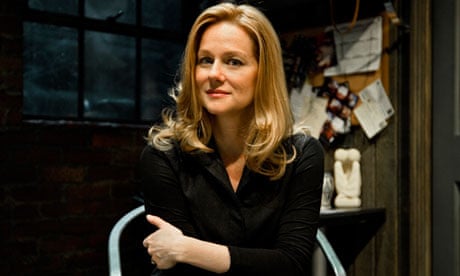
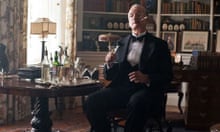
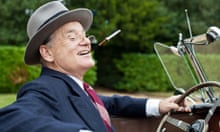
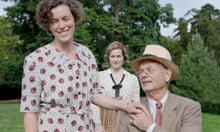
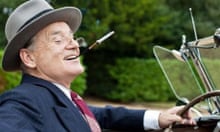

Comments (…)
Sign in or create your Guardian account to join the discussion